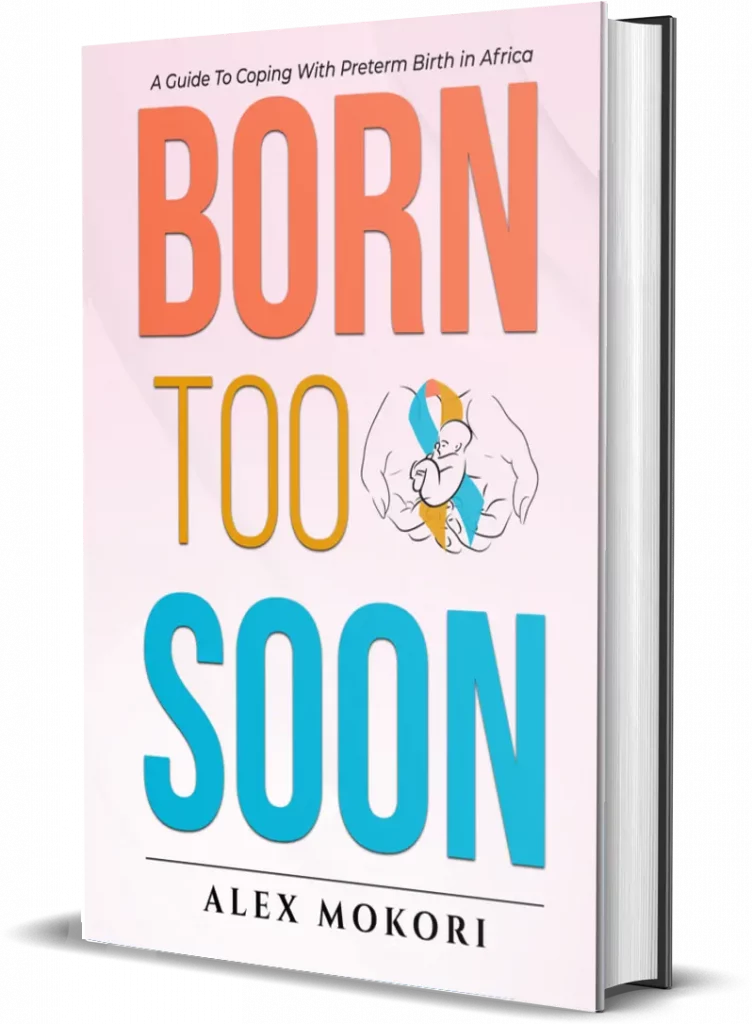Born Too Soon
About the Book

Born Too Soon: A Guide to Coping with Preterm Birth by Alex and Stella Mokori is a heartfelt, comprehensive guide designed for parents, caregivers, and healthcare professionals navigating the emotional, physical, and medical challenges of preterm birth. Drawing from the authors’ own experience with the premature birth of their son, Jair, this book offers a unique blend of personal storytelling and expert advice to provide valuable insights for those facing similar journeys.
Having experienced firsthand the overwhelming mix of fear, uncertainty, and hope that comes with preterm birth, Alex and Stella share their emotional and practical journey, offering support, encouragement, and actionable advice for others. The book covers everything from pregnancy preparation and the birth experience to caring for a preterm baby in the NICU, breastfeeding, and managing emotional stress. It also emphasizes the importance of creating a solid support system, both for the baby and the parents, to ensure a healthier and happier outcome.
Filled with empathy, real-world wisdom, and expert recommendations, Born Too Soon is more than just a book it’s a resource and a companion for every parent facing the unexpected challenges of preterm birth. Through their story, Alex and Stella inspire hope, resilience, and strength, showing that with the right tools, support, and love, families can overcome even the toughest of times.
Whether you’re a new parent, a healthcare professional, or someone seeking to understand the experience of preterm birth, Born Too Soon provides the guidance and reassurance you need to navigate this difficult but transformative journey.
Key Takeaways



Alex and Stella Mokori
Meet the Authors
Partners in life, business, and advocacy, Alex and Stella Mokori bring a unique perspective to the topic of preterm birth. Their personal experience, combined with their professional expertise, forms the foundation of “Born Too Soon: A Guide to Coping with Preterm Birth.”

Alex Mokori
Alex is a professional nutritionist with years of experience working in healthcare and nutrition management. His deep understanding of maternal and child nutrition proved invaluable during his journey as a father of a preterm baby. Alex’s expertise has shaped his approach to supporting parents through the emotional and physical challenges of preterm birth. His medical background has also given him a firsthand understanding of the importance of proper care, including the vital role of early intervention and nutrition for preterm babies.
Stella Mokori
Stella is a seasoned finance professional with a background in project management. Stella’s story is one of immense strength, balancing professional and personal life, while simultaneously navigating the intense and often overwhelming emotional landscape of a parent to a preterm infant. Her perspective offers an honest, compassionate, and practical approach to dealing with the hardships of preterm birth.
Together, Alex and Stella have worked on global projects and spent years traveling, learning, and contributing to social causes. Their love for their son, Jair, and their desire to help other parents in similar situations led them to write this book. Their journey from the uncertainty of a preterm birth to the strength they found in their community and each other has been transformative. “Born Too Soon” is more than just their story it’s a message of hope, practical advice, and a roadmap for navigating the overwhelming world of preterm care.
Alex and Stella believe that through the power of knowledge, empathy, and community, parents can face the challenges of preterm birth with resilience and love. They are committed to raising awareness, providing support, and giving parents the tools they need to care for their babies just as they did for theirs.
Chapters
Chapters We've Covered
Chapter 1: Our Background
In this opening chapter, Alex and Stella Mokori introduce their journey as first-time parents and their unexpected path to preterm birth. They share their backgrounds, highlighting their careers, relationship, and the excitement of pregnancy before it took a sudden turn. The chapter sets the stage for their story and explains how they found strength in each other during the emotional rollercoaster of a preterm birth. Their candid reflections on what they learned during their pregnancy, and the support they received from loved ones, frame the emotional and practical challenges they would face.
Chapter 2: Pregnancy Preparation
This chapter emphasizes the importance of preparation before pregnancy, particularly for women at higher risk for preterm birth. The authors discuss proper nutrition, self-care, and medical readiness, stressing the significance of prenatal care and understanding potential risk factors. Alex and Stella also share their experiences with pregnancy preparation, detailing how they balanced their busy lives while ensuring they were taking all the right steps. They encourage parents to consider their physical and emotional health as part of the preparation, recognizing that everything from nutrition to stress management plays a critical role in the health of both mother and baby.
Chapter 3: When Full Term is Not an Option
Here, the authors explore the reality of preterm birth and what it means when full-term delivery is no longer an option. They discuss the medical causes of preterm births, such as infections and complications, as well as the signs to look out for. Alex and Stella describe the emotional impact of being told that their baby would arrive early and the decisions they had to make in response. The chapter provides practical advice for handling the uncertainty and stress that comes with preterm labor, as well as guidance on caring for both mother and baby in such situations.
Chapter 4: Cesarean vs. Natural Birth: The Myths vs. The Facts
This chapter focuses on the decision between cesarean and vaginal birth, particularly in cases of preterm labor. The authors break down the myths and facts surrounding both methods of delivery, providing information to help parents make informed choices. They describe their own experience with a cesarean birth and share how they prepared for the possibility of surgery. The chapter also touches on the emotional and physical recovery after a cesarean and emphasizes that, regardless of the method, the focus should always be on the health of both mother and baby.
Chapter 5: The Birth
Alex and Stella recount the birth of their son, Jair, in this chapter, capturing the emotional whirlwind of the experience. They describe the suddenness of the situation, from the unexpected emergency cesarean to the initial moments spent with their tiny, fragile baby. The authors share their personal reactions, fears, and hopes during this intense time, reflecting on how they navigated the uncertainty of having a preterm infant. This chapter provides a deeply emotional account of the birth experience, offering readers both raw vulnerability and a message of resilience.
Chapter 6: Introducing Yourself to Your Newborn
In this chapter, the authors reflect on the early days of caring for their preterm baby and the emotional complexities of introducing themselves to a newborn under such unique circumstances. Alex and Stella discuss the challenges of bonding with a preterm baby, particularly when they are separated due to time spent in the NICU. They highlight the importance of physical touch and emotional connection through Kangaroo Mother Care (KMC) and share how this practice helped them strengthen their bond with Jair. The chapter emphasizes the importance of patience and understanding in building a relationship with a preterm baby, focusing on the emotional rewards of early bonding.
Chapter 7: Challenges of Having a Preterm Baby
This chapter delves into the medical and developmental challenges of caring for a preterm baby. The authors share their experiences with issues like jaundice, feeding difficulties, and growth concerns. They offer practical advice on how to monitor a preterm baby’s weight, feeding, and general health. The chapter also explores the emotional strain that comes with the challenges of having a preterm baby, highlighting the importance of mental and emotional support for parents. Alex and Stella encourage parents to seek out professional guidance and to be patient with their baby’s progress, offering strategies for managing the difficulties of the first few months.
Chapter 8: Finding Your Feet
In this chapter, the authors discuss the process of adapting to life with a preterm baby. Alex and Stella share how they navigated the transition to parenthood, balancing caregiving responsibilities with their own physical and emotional recovery. The chapter reflects on the changes in their relationship, their daily routines, and their identity as parents. It offers encouragement for parents who are still finding their footing, providing practical advice on how to manage sleep deprivation, feedings, and the stress of early parenting. The chapter focuses on resilience, offering a message of hope for parents who are adjusting to their new reality.
Chapter 9: Personal Support Systems
This chapter emphasizes the importance of a strong support system for parents of preterm babies. Alex and Stella reflect on how critical it was for them to lean on their family, friends, and healthcare professionals for help. They discuss how support systems can offer not only practical assistance but also emotional comfort during times of stress. The chapter stresses that no parent should face the challenges of preterm birth alone and that building a network of supportive individuals is essential for mental health and well-being. It also touches on the importance of involving fathers in the caregiving process and the benefits of having a team approach to parenting.
Chapter 10: Changes Needed in Outer Support Systems for Mothers
Alex and Stella take a broader look at societal systems and how they can better support mothers, especially those who experience preterm birth. This chapter addresses the role of healthcare professionals, institutions, and governments in providing adequate care for preterm babies and their families. The authors advocate for increased resources, better training for healthcare providers, and more policies that support mothers’ health and well-being. They discuss their own experiences with healthcare systems and offer recommendations for how to improve the quality of care for preterm infants in the future. The chapter highlights the need for systemic change to provide better support for families navigating preterm birth.
Chapter 11: Changing Mindsets
This chapter tackles the cultural and societal perceptions surrounding preterm birth and how they can be detrimental to mothers and families. Alex and Stella share their own struggles with the stigma and judgment they faced after Jair’s early arrival. They call for a shift in mindset, encouraging people to move away from blame and guilt and to focus on support and understanding. The chapter also discusses the importance of mental health care for mothers of preterm babies, addressing the psychological challenges that often accompany preterm birth. It provides strategies for overcoming societal pressures and building a more supportive community for preterm parents.
Chapter 12: Looking Ahead
In this final chapter, Alex and Stella look toward the future and offer encouragement to parents who are just beginning their journey with a preterm baby. They reflect on their own growth and the lessons they’ve learned through their experience. The chapter focuses on hope and resilience, reminding parents that despite the difficulties, preterm babies can thrive with the right care and support. The authors offer practical advice for navigating life beyond the NICU, from dealing with health concerns to fostering emotional well-being. This chapter is a message of empowerment, urging parents to stay optimistic and to trust in their ability to give their babies the best future possible.
Testimonials and Reviews
Our Happy Readers
Recent Posts
Blog & Resources

The Emotional Rollercoaster of Preterm Birth

The Importance of Kangaroo Care for Preterm Babies

The Power of Support Systems for Parents of Preterm Babies
Buy Now
Get Your Copy
Contact
Get in Touch with Us
Have a question, a media inquiry, or looking to invite us for a speaking engagement? Use the contact form to reach out, whether it’s for collaborations, interviews, or personal messages. We’d love to hear from you!







